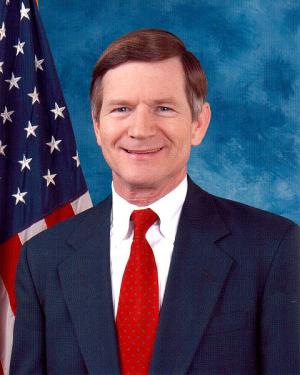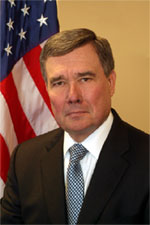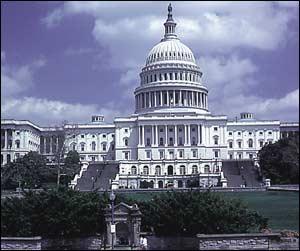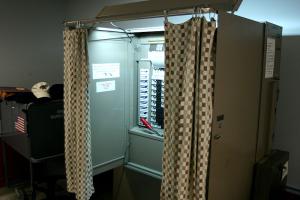Everybody's got an opinion on why Prop 19 lost. The Chronicle examines what a range of movement leaders and other thinkers think it means -- and what the discussion of why Prop 19 lost itself means.
With the Republicans taking over the House, the landscape of Capitol Hill drug reform has shifted, mainly for the worse. But not entirely.
The post-mortems are still coming in from last week's elections, but the marijuana reform movement already has its eyes on 2012.
It's not a done deal yet in the Arizona medical marijuana vote, the California attorney general vote, and a Washington state representative race of interest to drug reformers. Also, some election odds and ends.
A sticky-fingered sheriff leads this week's list of law enforcement miscreants.
The federal persecution of California medical marijuana providers continues. Now, upon losing an appeal, Dr. Mollie Fry and partner Dale Schafer are most likely headed for federal prison.
The battle over New Jersey medical marijuana regulations continues, with both Assembly and Senate committees passing resolutions saying the regs are inconsistent with the law and demanding they be rewritten.
The Republicans ran on a vow to cut the budget deficit, but were short on specifics. The Heritage Foundation has a few ideas, including axing the drug czar's office and some other anti-drug spending.
A post-election poll strongly suggest that marijuana legalization could win in California in 2012.
The acceptance of medical marijuana in Israel has taken another step forward, with a health ministry committee recommending it be considered as a medicine and made available in pharmacies.
Events and quotes of note from this week's drug policy events of years past.
In the week since Proposition 19, the California marijuana legalization initiative, was defeated 46% to 54%, the post-mortem analyses have been coming down fast and furious. Even in defeat, Prop 19 continues to generate mountains of verbiage, and advocates will tell you that's just one of the positive outcomes generated by the initiative.

As the polls closed, Oaksterdam waited.
Indeed, the post-election output on Prop 19 has been stunning. Russ Belville of NORML has
10 Lessons Learned from Marijuana Election Defeats, while the Christian Science Monitor has
Three Reasons Prop 19 Got the Thumbs Down (federal government opposition, midterm voter demographics, and fear of regulatory gridlock), and Pete Guither at the Drug War Rant has his own
Prop 19 Wrap-Up.
Harvard economist Jeffrey Miron, a libertarian and academic advocate for legalization, asks
Why Did California Vote Down Pot? Miron answers that Prop 19 overreached with its arguments (on tax revenues and ending the Mexican drug war) and its provisions (limiting employers' rights). In
Post-Prop 19, the Los Angeles Times, in a piece whose tone hints at support for legalization in principle, blames initiative organizers for presenting the public with "a badly drafted mess."
Steve DeAngelo of the Harborside Health Center in Oakland warns that
Voters Won't Approve Legal Pot Until Advocates Earn Their Trust, and argues the movement should be concentrating on developing a well-regulated and demonstrably safe medical marijuana cultivation and distribution system to allay the fears of parents and others concerned about the Wild West aspects of California's dispensary system. Interestingly, the 11 counties surrounding San Francisco Bay, where local authorities have most promptly moved to put regulations in place, are the only counties where a majority of voters did vote yes on 19.
Pollwatcher Nate Silver wonders
Are Parents Just Saying No to Marijuana Legalization?, pointing to national survey data suggesting that being a parent drops support for legalization by 10 to 15 percentage points. Atlantic magazine business and economics editor Megan McArdle reprises ongoing arguments in
Will Pot Be Legal? and sides with Silver on the role of parents.
And that's just a representative sample of the debate over why Prop 19 lost. For Prop 19 supporters, that ongoing argument is just more evidence that the measure has caused a seismic shift in the political discourse on pot.
"We started putting out the message two months ago that Prop 19 is a winner," said
Drug Policy Alliance head Ethan Nadelmann. "It transformed the debate. Compare where we are now to where we were two years ago. There is a consensus that between the messaging that came out, the positive impact on the public dialogue, the mainstream players coming out with endorsements, and getting more votes than Meg Whitman or Carly Fiorina, Prop 19 was a major step forward," he said.
"What was significant was George Soros coming in with that contribution and his op-ed," Nadelmann continued. "Soros has been a major supporter of marijuana decriminalization, but he was always ambivalent about legalization, in part because of concerns about the impact on young people. Prop 19 being on the ballot and his being asked by so many people what he was going to do encouraged him to think more deeply about it. That he decided to write that piece and make that contribution, even in late October, when he knew the odds of winning were not great, is important for the future."
Even though Soros didn't come through until the final week of the campaign, and the campaign struggled financially (even while outdistancing the opposition), Nadelmann didn't see that a reason the measure lost. "I'm skeptical that substantially more money earlier on would have clinched this," he Nadelmann. "What was really problematic was the turnout. Young people did not show up en masse."
He wasn't the only one looking at turnout. "In a midterm election year like this with a Republican sweep nationally, we didn’t see the types of voters who favor marijuana legalization coming to the polls," said Mike Meno, communications director for the
Marijuana Policy Project.
"The only way to respond to a loss is to learn from it," said
NORML founder Keith Stroup. "There were two or three specific areas where our opponents were effective, specifically on the employer-employee issue. You had the Chamber of Commerce saying employers couldn’t fire someone coming to work stoned, and some of the law enforcement folks got traction with the idea that roads would be filled with stoned drivers. We have to be clear that if someone is stopped for driving while impaired and they pass the alcohol test, that police have the right to take them in for a drug test," he said.
That position isn't likely to sit well with the veteran stoner demographic, who will argue that marijuana really doesn't impair driving ability that much among experienced tokers. Better to test for actual impairment than the presence of metabolites, especially if impairment is assumed under a "zero tolerance" DUID law, but that's going to be a hard sell for the general public.
"I am among those people who felt that even though we lost, Richard ended up doing a good thing for the movement," said Stroup. "I don't think legalization was ever taken seriously by politicians and the press until Prop 19 came along. It was probably worth the three or four million dollars spent to force marijuana legalization into the mainstream."
"One of the things that really caught on with the opposition and helped spread seeds of doubt in voters' minds was the local control aspect, allowing different counties to decide whether to regulate," said Meno. Ironically, that provision was a concession designed to blunt potential opposition by allowing more conservative areas to opt out.
"The polling shows that workplace concerns and fears of driving under the influence helped motivate the no vote," Meno added. "Those same concerns apply to alcohol, but they're not arguments for making alcohol illegal. With sensible public education, these issues can be addressed. We need to deal aggressively and proactively with the issues around driving while impaired so there isn't the really poor media coverage we saw this time. That gave people the ability to leap from legalization to impaired driving. We need to address these fear-based arguments," he said.
Even the Prop 19 campaign now says maybe the workplace language wasn't a good idea. "I remember having an uneasy feeling about the employment part, but one of our more conservative consultations was for it," said Richard Lee, the man behind Prop 19. "I should have listened to my gut, but it's hard not to want employees to be free from uncalled for drug testing."
"This result was predictable from the early polls," said Dale Gieringer, head of
California NORML, which endorsed Prop 19 but was skeptical about its prospects from the beginning. "One of the problems was that legalization scores in the low fifties in the polls, and you need it in the sixties to pass. In any initiative, there are particulars that people object to, and support begins to erode, and this was criticized from all sides."
The California public is ready to go along with legalization if presented with a plan that makes sense and will actually do what it promises, but Prop 19 wasn't that plan, Gieringer said. "The closer you looked at Prop 19, the less it offered in immediate benefits to the state," he argued.
"As soon as any city or county tried to implement 19, they would get hit with a federal injunction, which the feds would certainly win," Gieringer said. "So, no tax and regulate, no tax revenues, and you get a bunch of lawsuits with the feds. It wasn't going to solve the drug war in Mexico, it wasn't going to save all that much in arrests, especially since Schwarzenegger signed that decriminalization bill, and a lot of marijuana offenses have to do with exporting out of state, and that would remain. Prop 19 would have been the first step in a much larger battle going on for years before you really get those benefits, and voters didn't trust that those benefits would actually come."
"We've lost a lot of battles at NORML," Stroup laughed wryly. "But what is important when you lose is what you learn. We came away from California knowing we can do it better, and we will do it better. I think in 2012, the whole West Coast will be proposing that we legalize marijuana."
Richard Lee and his crew are already making plans to put together a new initiative in 2012, but if California's recent history is any indicator, they are unlikely to be the only ones. If one or more of them make it to the ballot in 2012, they better have learned the lessons of 2010.
back to top
Last week, a resurgent Republican Party retook control of the US House of Representatives, giving the Democrats a drubbing the likes of which has not been seen for decades. The Democrats lost 61 seats, seeing their side sink to 189 seats to the Republicans' 240. They needed 218 to take over again.
The change in control of the House has some serious drug policy implications. There's bad news, but maybe also some good news.
Reform measures passed in the current Congress, such as repealing the bans on federal funding of needle exchange programs and implementation of the Washington, DC, medical marijuana program, could see attempts to roll them back. And pending reforms efforts, such as the battle to repeal the HEA student loan provision, are probably dead. Reform friendly Democratic committee chairs, who wield considerable power, have been replaced by hostile Republicans.
But the incoming Republicans made slashing the deficit and cutting the federal budget a winning campaign issue for themselves, and will be looking for programs they can cut or eliminate. That could open the door to hacking away at programs that support the ongoing prosecution of the drug war, but it could also open the door for cuts in prevention and treatment programs.
As the Chronicle noted
here earlier this week, it's not just Tea Party types who want to wield the budget ax. The mainstream conservative Heritage Foundation issued a report just before election day laying out a whopping $434 billion in federal budget cuts, including eliminating the Office of National Drug Control Policy, the drug task force-funding Justice Assistance Grant (JAG, formerly the Byrne grant program) program, and the Safe and Drug Free Schools and Communities state grant program.
"Budgetary issues is where I'm most optimistic," said Bill Piper, veteran national affairs director for the
Drug Policy Alliance. "Given the fiscal climate, there could be real cuts in the federal budget. Next year is probably an unprecedented opportunity to de-fund the federal drug war. These new Republicans are a different breed—anti-government, anti-spending, pro-states' rights, and some are proven to be prone to bucking the leadership. If the Republican leadership votes to preserve the drug war, they may rebel," he said.
"We can go after the Byrne grant program," Piper enthused. "That's a very important deal. If we can cut off drug war funding to the states, the states won't be able to afford their punitive policies anymore. During the recession in the Bush administration, when the administration was cutting money to the states, a lot of states passed reform measures because they couldn't afford to lock people up. This time, the federal government has been bailing out state criminal justice systems, but if we can cut or eliminate Byrne grants, the states won't have money for their drug task forces and imprisoning people. Then they will have to consider reforms like cutting sentences and making marijuana possession an infraction."
"Sentencing reform on budgetary grounds is possible," said Kara Gotsch, director of advocacy for the
Sentencing Project. "From our perspective, that is a way to reduce government spending. If you want to reduce drug war spending, you reduce costs by investing in prevention and substance abuse programs. That will be part of our talking points, but the reality is, to be successful they're going to have to be bipartisan."
Eric Sterling, former House Judiciary Committee counsel and current head of the
Criminal Justice Policy Foundation was less sanguine than either Piper or Gotsch about the urge to cut the deficit leading to progress in drug reform. "The prospect of saving money leading to criminal justice and drug policy reform is remote," said Sterling. "In state legislatures where they have to balance the budget, everyone recognizes what has to happen. But in Congress, they know there is still going to be a deficit."
Sterling also questioned just how different the Republican freshman class will be from traditional Republicans. "That's a big question mark," he said. "They are younger and bring with them different experiences about drug policy or marijuana in particular, but most of these men and women won by using traditional themes that most incumbent Republicans used, too. I think for them, cracking down on drugs and crime will have more value than trying to save money by funding diversion or correctional programs that aren't about harsh punishment."
But Piper remained upbeat. "Next year is probably an unprecedented opportunity for the movement to defund the drug war. The stars are aligning. A lot of tax groups are already on record for cutting some of these programs," he noted. "Given the fiscal climate, we could see considerable cuts in the federal budget. The type of Republicans coming into office, as well as Obama's own need to show he can practice fiscal discipline, means a real chance to cut or eliminate some of those programs," he said. "The down side is that funding for prevention and treatment is likely to come under fire, too."

Rep. Lamar Smith (R-TX) -- no friend of drug reform.
While budget battles will be fought in appropriations committees, criminal justice issues are a different matter. One of the most striking changes comes in the House Judiciary Committee, where pro-drug reform Democrats like chairman John Conyers (D-MI) and Subcommittee on Crime, Terrorism, and Homeland Security chair Bobby Scott (D-VA) are being replaced by the likes of Rep. Lamar Smith (R-TX), who will head the Judiciary Committee. Smith, a conservative old school drug warrior, was the only congressman to speak up against passage of the bill to reduce the disparity in crack and powder cocaine sentences.
He also authored a bill this fall that would have made it a federal offense for US citizens to plan to commit acts outside the US that would violate US drug laws. While that bill was allegedly aimed at large drug trafficking organizations, it could have made federal criminals out of college students making plans to visit the coffee shops of Amsterdam. He took to Fox News last month to lambaste the Obama administration as insufficiently tough on marijuana law enforcement, a clip he displays on his
web site (scroll over the small video screens; the title will pop up).
"The fact that Rep. Smith is going to be the chair will definitely have an impact," said Gotsch. "He was the only vocal opposition to the crack cocaine sentencing reform, and the fact that he is now going to be chair is discouraging. It indicates that he won't be thoughtful about sentencing reforms for low level drug offenders."
"The Democratic committee chairs were good on drug policy and unlikely to advance bad drug war bills," said Piper. "Now, with Conyers and Scott gone and Lamar Smith in charge, we can expect stuff like Smith's foreign drug conspiracy bill to come out of that committee."
"You couldn’t find bigger champions for reform than Scott and Conyers," said Gotsch. "We won't have them as chairs now; that's probably the biggest disappointment to our community."
"Smith has been quite out there in his attacks over the drug issue," said Sterling. "My hunch is that we will take advantage of the political attractiveness of the drug issue to try to have both oversight hearings and legislation that would be embarrassing to Democrats."
And don't expect too much from the Democrats, either, he added. "The Democratic caucus is going to be more reluctant to deal with the drug issue in a progressive way than it has been," said Sterling. "They see it as a distraction from the heart of the message they need to bring to retake power in 2012."
With people like Smith holding key House committee positions, the drug reform agenda is likely to stall in the next Congress. Instead, reformers will be fighting to avoid reversing earlier gains.
"In terms of passing good things, there probably wasn’t a lot more that was going to happen with Democrats before 2012," said Piper. "The important low hanging fruit of overturning the syringe ban, the DC medical marijuana ban, and the crack sentencing bill had already gotten through. We might have been able to achieve repeal of the HEA drug provision, but probably not now."
The drug reform movement's job now will be not only blocking bad legislation, but also fighting to prevent a rollback of drug reform victories in the current Congress, such as the repeal of the bans on syringe exchange funding and implementing the Washington, DC, medical marijuana law, said Piper.
"They're unlikely to go backwards on crack, but the syringe ban and the DC medical marijuana ban were both repealed with some, but not a lot, of Republican support," he said. "The syringe ban repeal barely passed, and that was in a Congress dominated by Democrats. Will they try to restore the syringe funding ban and overturn DC's medical marijuana program? That's our big fear. Hopefully, we can scrape up enough votes to defeat in the House, or stop it on the Senate side," he said.
Piper also dared to dream of an emerging Republican anti-drug war caucus. "We don't know who these new Republicans all are, but some have probably been influenced by Ron Paul (R-TX)," he said. "If only 10 of them stand up against the drug war, that's a huge opportunity to raise hell in the Republican caucus. Almost a third of Republican voters want to legalize marijuana, and that's an opportunity for us, too. Maybe there will be Republicans we can work with and create a truly bipartisan anti-drug war coalition in Congress. That's a foothold."
For Piper, the future looks stormy and cloudy, but "the silver lining is in appropriations fights and opportunities to organize an anti-drug war movement in the Republican caucus. We just have to play defense on a bunch of stuff," he said.
"The activist community is going to have to figure out what the recipe for our lemonade is," advised Sterling. "That requires first a redoubled effort at organizing, using themes such as the wise stewardship of the scarce resources we have, and what works and what is effective," he said.
"It also requires mobilizing people not involved in this issue before, whether it's the business community or people who see their rice bowls been broken by the Republican approach," Sterling continued. "Teachers, nurses, people asking how come the part of the public work force this is protected is the police and the police guards. Drug policy reform activists have to think about what are the alliances they can make in this time of public resource scarcity."
back to top
Disappointed yet emboldened by Proposition 19's eight point loss a week ago, state and national marijuana legalization leaders are already planning to push for initiatives in as many as five states in 2012. Meetings in California and Colorado in the past few days are laying the groundwork for legalization initiatives there, and similar efforts are being talked about for Nevada, Oregon, and Washington.

Rep. Tom Ammiano will get even more attention now.
With election post-mortems already yielding to pre-planning the next campaigns, the legalization movement smells victory in the air not too far down the road. And the
Yes On 19 campaign team is hitting the ground running.
"I just got out of a meeting where we're trying to put together an all-star team to be the board for a 2012 campaign," said Richard Lee, the Oakland medical marijuana entrepreneur behind the Prop 19 campaign. "We're hoping to have a formal announcement Thursday, but we'll see how that goes."
If it happens, though, don't count on Lee to be kicking in a million-plus dollars again. "Part of the reason for building this coalition is that I'm tapped out," said Lee. "But I think we got our money's worth, we got a $100 million worth of free media."
The meeting Lee mentioned was of the group's steering board, said activist team Chris Conrad and Mikki Norris, who were there. "We're exploring another initiative run in 2012, and it's looking pretty likely because we achieved so much with this campaign, especially with the coalitions we built to support this effort," said Norris.
"There is a real interest in making sure the activist base is included," said Conrad. "We want to try to avoid the divisiveness of this campaign," he added, alluding to intramural attacks from some growers, the Stoners Against Prop 19 types, and elements of the medical marijuana community. "But people feel they have to have a certain thing, and how can you achieve unity like that? People have to be able to compromise," he said.
National reform groups are also feeling optimistic about 2012. "Even though we lost in California, Richard ended up doing a good thing for the movement," said
NORML founder Keith Stroup. "When you look at what went on in the last six or eight months, I don’t think legalization was ever taken seriously by politicians and the press until now. It was probably worth the three or four million spent on that to force marijuana legalization into the national and international spotlight."
Despite this year's loss, "the big picture is Gallup polls showing support higher than ever," said
Marijuana Policy Project spokesman Mike Meno. "Even some Californians who voted against Prop 19 believe it should be legal. On the central issue, it seems the public is increasingly on our side and heading for a majority."
Prop 19 brought the issue center stage, Meno said. "This year, we had more mainstream press coverage than ever, the debate is out in the open, and many Americans are now for the first time in their lives really thinking seriously about legalizing marijuana."
"There seems to be a consensus around working toward 2012," said Meno. "It's a presidential election year, and there will be more young voters. If the polls continue to trend up, there's no reason not to optimistic that states like Colorado or Washington couldn’t pass something like Prop 19. We're looking at strategically supporting a pair of legalization initiatives in Colorado and California. Support is high, and we have two more years to build on that."
"If I were a betting man, I'd say there's a better than 50-50 chance we'll see initiatives in California and Colorado, said Drug Policy Alliance head Ethan Nadelmann. "It's hard to say about the other states at this point."
Nadelmann saw three possibilities for 2012 initiatives. "First is that badly drafted initiatives get on the ballot and then lose badly," he said. "But my hope is that well-drafted initiatives get on the ballot with strong majority support, and that inspires wealthy donors to provide backing. The third possibility is that well-drafted initiatives get on the ballot notwithstanding the fact they have less than 50% going in. The challenge in that case will be to ensure that even though they are likely headed for defeat, they move the ball forward like Prop 19 and Colorado in 2006."
Initiative campaigns will focus on a number of themes, said Nadelmann. "You have the continuing nightmare in Mexico, you have the surveys showing young people saying it's easier to buy pot than alcohol, and you have the continuing indictment of the failures of prohibition," he said. "And evidence that decriminalization is not enough. Decrim in California and New York did not prevent massive increases in arrests in the past 20 years and the racial disproportionality that accompanied them. Legalization may have its risks, but it's preferable to the status quo.
There are a few cautionary voices when it comes to another legalization initiative in California. "Another initiative here in California might be a good idea, but it's premature to say that," said Dale Gieringer of
California NORML. CANORML supported Prop 19, but Gieringer from the beginning voiced doubts about its prospects for success. He has doubts again about 2012 in California.
"California voters don’t really like to have the same issue revisited in successive elections," he said. "There have been a bunch of issues that have failed under those circumstances," he recalled, ticking off parental concept for abortion, eminent domain reform, and a school voucher initiative. "I can't think of a case where people have been able to flip the vote in two years," the student of California politics said.
Gieringer also raised another potential problem. "Who is going to fund it? Richard Lee said he doesn’t have the money to do it again. You need a million dollars to get on the ballot," he pointed out. "If I were a major funder, I'd be looking at a less expensive state," he said.
Still, Gieringer said, CANORML would be holding a statewide conference in January to try to begin to see if there is a consensus that can be reached among the state's complex and fractious pot community.
It doesn’t have to be an initiative. There is the legislative process, and this year, Rep. Tom Ammiano managed to get his legalization bill through the Assembly Public Safety Committee. He'll be back at it next year.
"We will be reintroducing our bill to tax and regulate at the beginning of the next session," said Ammiano spokesperson Quintin Mecke. "We'll be looking at any possible changes between now and then."
Mecke credited Prop 19 with moving the issue forward. "I think Prop 19 has put marijuana firmly in the mainstream conversation and the public policy conversation is now being debated at the highest levels of government. People can't just make jokes about it anymore. We are getting close to challenging this notion that we can deal with marijuana simply through law enforcement."
And it doesn't have to be California.In Colorado,
SAFER (Safe Alternatives for Enjoyable Recreation) and
Sensible Colorado last Thursday announced that they were pushing ahead with a legalization initiative for 2012. And Saturday, a statewide conference brought national movement figures including
SSDP head Aaron Houston,
Drug Policy Alliance head Ethan Nadelmann, Steve Fox of the Marijuana Policy Project, and Prop 19's Jeff Jones to Denver to help lay the groundwork. The Saturday summit was also the scene of the announcement of a second initiative campaign,
Legalize It 2012, a Jack Herer-style "freedom based" measure, led by Laura Kriho of the Boulder-based Cannabis Therapy Institute.
"There is a great deal of interest in a 2012 statewide initiative to regulate marijuana and start treating it like alcohol," said SAFER's Tvert. "I think we're poised to make this happen. We've seen support go up dramatically over the past five years and internal polls had it at about 50% this year. Attitudes here have reached a point where this is very realistic," he said.
"The folks in Colorado are determined to go forward even if the polls are not promising," said Nadelmann. "We are committed to trying to make this as smart and tight an initiative as possible, even though it will be difficult to raise money."
"We need to get a lot of folks opinion on this, particularly the medical marijuana industry here, where we have hundreds of licensed medical marijuana centers," Tvert said. "We hope to work with them to pass a law that will benefit everyone. There is no specific language yet, but that is what we are beginning to get together."
Tvert said he hoped the community would coalesce around one initiative. "People are doing polling and seeing what language will work," he said. "I hope in the end we will go forward with one initiative that will be the best law possible."
As noted above, similar efforts are underway in Nevada, Oregon, and Washington. The marijuana reform movement thinks it is can go over the top in the next election cycle. Only 103 weeks until we find out if they're right.
back to top
It ain't over 'til it's over, and in a trio of races of interest to drug reformers, it ain't over. There are also a handful of other races of interest that we haven't mentioned yet. Here's a post-election roundup:
In California, in a race critical to the state's medical marijuana industry that is still close to call, Republican attorney general candidate Steve Cooley Saturday retook the lead from Democratic candidate Kamala Harris. Cooley is a determined foe of the existing dispensary system and has said he believes any dispensary sales of marijuana are illegal. As of Thursday morning (11/11), with only some absentee and provisional ballots still to be counted,
Cooley has 45.9% of the vote to Harris's 45.7%. The Greens got 2.6% of the vote, the Libertarians got 2.5% of the vote, and the Peace and Freedom Party got 1.6% of the vote. As of this writing, Harris trails by about 22,000 votes.
In Arizona, in a race that is still too close to call, the medical marijuana initiative, Proposition 203, trails by slightly more than 5,000 votes out of 1.5 million cast, but with fewer than 130,000 mail-in and provisional votes yet to be counted. As of Wednesday night,
Prop 203 trails with 49.9% of the vote, compared to 50.1% opposed.
In Washington state, drug reformer and incumbent state Rep. Roger Goodman is
leading narrowly in a race that probably won't be called until December 2, the last day for the secretary of state to certify election results. Goodman, the head of the
Voluntary Committee of Lawyers, a national organization affiliated with the
King County Bar Association Drug Policy Project that Goodman founded, leads challenger Kevin Haistings by a margin of 51.2 to 48.8%.
Only 60% of the votes were counted election night, and Goodman was down by 500 votes then. Since then, the percentage counted is up to 91%, and Goodman has pulled ahead by more than 1,200 votes. For Haistings to pull it out, the late vote trend would have to dramatically reverse.
Also in Washington state, a drug law reforming candidate for Snohomish County prosecuting attorney, Jim Kenny, failed in his bid to win office.
Kenney got only 30.03% of the vote, compared to 68.76% for his opponent, Mark Roe. Both ran as Democrats.
In Florida, drug reformer Jodi James was defeated in her bid to be elected state representative in District 31. Running as a Democrat,
James got 37.81% of the vote, while Republican candidate John Tobia won with 62.19%.
In New York, Rockefeller drug law reformer Eric Schneiderman was elected attorney general.
He won 54.9% of the vote, beating Republican candidate Dan Donovan, who had 43.7%. Also in New York, anti-prohibitionist candidates Randy Credico and Kirsten Davis picked up 0.6% and 0.5% respectively in their races for US senator and New York governor.
In Vermont, pro-marijuana decriminalization Democrat Peter Shumlin eked out a narrow victory over Republican Brian Dubie.
Shumlin got 49.24% of the vote to Dubie's 47.46%.
back to top
A sticky-fingered sheriff leads this week's list of law enforcement miscreants. Let's get to it:

(photo from deviantart.net, via Wikimedia)
In
Williamsburg, Kentucky, the
Whitley County sheriff was indicted Monday on charges he stole hundreds of thousands of dollars of public funds. Sheriff Lawrence
Hodge faces 18 felony counts of abuse of public trust and three felony counts of tampering with physical evidence. Most of the counts allege he took money from office accounts, but some charge that he sold or gave away guns that had been seized. He is accused of stealing around $350,000 over a seven-year period, including $100,000 he claimed was to be used in drug investigations. He faces five to 10 years in prison on most of the counts.
In
Monongahela, Pennsylvania,
a fired Monongahela police officer pleaded guilty Tuesday to peddling cocaine and interfering in an undercover investigation of his drug-dealing friend. George
Langan, a 16-year veteran of the department, was also accused of snorting cocaine at the home of his chief's ex-wife while in uniform and carrying his weapon. He went down after a local dealer jailed on drug charges snitched him out. He will begin serving a one to two year prison sentence in January.
In Batavia, Ohio,
a Felicity Police Department captain pleaded guilty Tuesday to an evidence tampering charge after being caught in a sting where he seized fake
Oxycontin tablets from an undercover agent and failed to turn them in.
Capt.
Delmas "Gee" Pack
Jr., 42, is free on his own recognizance while awaiting sentencing. He faces up to 10 years in prison. Pack went down after years of complaints that a Felicity police officer confiscated illegal drugs, but never filed charges or turned in the drugs.
In Houston,
a Harris County jail guard was arrested November 3 for trying to smuggle drugs and other contraband into the facility. Guard Henry Fairlie, 51, went down after an investigation by the Harris County Sheriff's Department. He is charged with possession with intent to deliver a controlled substance (Xanax) and introducing contraband into a penal institution.
In Brownsville, Texas,
a fugitive US Customs and Border Protection officer was arrested October 31 as he crossed a bridge back into the United States. Officer Luiz Enrique Ramirez, 38, had been on the run since February 2009, two months before an indictment naming him was issued. The 13-count indictment charges him with trafficking, drug trafficking, and bribery. According to the criminal complaint, since August 2005, Ramirez allegedly conspired to bring undocumented immigrants into the country by using his official capacity as a government official for financial gain. From November 2007, Ramirez is accused of conspiring to use his official capacity to bring kilogram quantities of cocaine into the country.
back to top
A panel on the 9th US Circuit Court of Appeals has upheld the marijuana cultivation and distribution conspiracy convictions of California Dr. Marion "Mollie" Fry and her partner, Dale Schafer. Fry and Schafer, both medical marijuana patients, had been sentenced to five years in federal prison in the case, but were free on bail pending the appeal. There is no word yet on when they will have to report to prison or whether they will try further appeals.
After developing breast cancer, Dr. Fry turned to medical marijuana, and she and Schafer built up a medical marijuana practice, with Dr. Fry writing recommendations and she and Schafer growing and distributing marijuana to patients. They did so with the understanding from local law enforcement that they were in compliance with state law.
But local law enforcement was working with the DEA, and the couple was raided, arrested, and convicted of violating federal drug control laws. Because they were convicted of growing more than 100 plants, they face mandatory minimum five-year prison sentences.
They appealed the conviction, arguing that because local law enforcement agents were cooperating with the DEA at the same time they were assuring the couple they were in compliance with state law, local law enforcement was in effect working for the feds to entrap them. They also argued that local law enforcement entrapped them for sentencing purposes by encouraging them to grow more than 100 plants, the number that triggers a mandatory minimum sentence. And they argued their convictions should be overturned because they were not allowed to mount a medical marijuana defense.
But the 9
th Circuit panel didn't buy any of it. In the
opinion authored by Judge Richard Tallman, the court held that Fry and Schafer did not prove they were entrapped and that they were correctly precluded by Supreme Court precedent from mounting a medical marijuana defense. Now, the health-care providing couple are most likely headed to federal prison for their efforts.
back to top
After hearing overwhelmingly negative testimony about proposed medical marijuana regulations developed by the state Department of Health and Senior Services, committees in both the New Jersey Assembly and Senate voted Monday in favor of resolutions demanding that the department rewrite the regs to increase patient access, reduce burdens on doctors, and remove onerous rules.
The resolution gives the department 30 days to rewrite the rules. Although Gov. Chris Christie (R) could heed the signal from today's vote and allow the process to move forward, that's not likely, said Ken Wolski of the
Coalition for Medical Marijuana-New Jersey. Instead, he said, the resolutions will most likely have to be approved in floor votes.
"The concurrent resolutions in the Senate Health Committee and the Assembly Legislative Oversight Committee said the draft regulations were not consistent with the legislation," said Wolski. "There were hearings all afternoon, and testimony in favor of the resolutions was overwhelming."
New Jersey's medical marijuana law was signed in January by outgoing Gov. Richard Corzine (D). When Christie took office, he sought a six month delay in implementing the program, but the legislature only gave him three. The health department issued draft regulations for the medical marijuana program last month. Among the new limitations: A physician registry, capping THC content, having just three strains of cannabis and limiting cultivation to just two centers.
If the health department refuses to rewrite the regulations or comes back with another restrictive draft, the legislature could simply take over and draft regulations itself. But perhaps Gov. Christie and the executive branch will get the message now and quit standing in the way of patients, doctors, and providers.
back to top
In an attempt to provide some specifics for Republican promises to reduce the budget deficit by cutting federal spending, the conservative Heritage Foundation has issued a backgrounder report saying Congress should eliminate the Office of National Drug Control Policy (the drug czar's office), the Safe and Drug-Free Schools and Communities state grant program, and all Justice Department grant programs, except those for the Bureau of Justice Statistics and the National Institute of Justice. That means the drug task force-funding Justice Assistance Grants (JAG, formerly known as the Byrne grant) are on the chopping block, too.

Goodbye Gil?
The report said the federal government could cut a whopping $434 billion and the savings could come from eliminating waste, fraud, abuse, and outdated or ineffective programs;consolidating duplicative programs, targeting programs more precisely, privatization, and "empowering state and local governments" by reducing federal funding for them.
Taxpayers could save $30 million by axing the "duplicative" drug czar's office and $298 million by eliminating the Safe and Drug Free Schools state grants, which are used for violence and drug and alcohol prevention programs. The Byrne grant program, which can also be used to fund drug treatment and prevention, is set at $598 million in the Obama administration's FY 2011 budget request.
The drug budget cuts are only a tiny fraction of the $343 billion that Heritage said should be cut. The report takes the budget ax to nearly $20 billion in agriculture funding, nearly $8 billion in community development grants, nearly $8 billion in federal education spending, more than $7 billion in energy and environmental spending, nearly $92 billion from federal government operations (including federal employee pay freezes), and nearly $7 billion by cutting federal job training and Job Corps funds.
If the cuts proposed by the Heritage Foundation in its entirety were to be enacted, they would radically shrink the federal government and redraw the picture of what the people expect from government. But the Republicans only control one chamber of Congress, some of the proposed cuts could lead to dissent even within GOP ranks, and Democrats and people who stand to lose out are sure to fight them.
Still, it would be nice if the spirit of bipartisanship could prevail long enough to begin closing the book on decades of wasted and counter-productive federal drug prohibition spending, even though we wouldn't want to see proven prevention programs slashed.
back to top
California voters rejected Proposition 19, the tax and regulate marijuana legalization initiative, by just under eight percentage points, but a post-election poll has found that they still favor legalizing pot. The poll also suggests that if youth turnout had equaled that in 2008, the campaign to free the weed would have ended in a dead heat.
According to the poll, which was conducted by Greenberg Quinlan Rosner, 52% said marijuana prohibition does more harm than good. And 49% said marijuana should be legalized, with 41% opposed and 10% undecided.
"There’s a fair amount of latent support for legalization in California," said Anna Greenberg, the firm’s senior vice president. “It is our view, looking at this research, that if indeed legalization goes on ballot in 2012 in California, that it is poised to win."
So why didn't Prop 19 win? One quarter of those who opposed Prop 19 had considered voting yes and 31% of the no voters said they believed marijuana should be legalized or have penalties reduced, but objected to some aspect of the initiative.
The poll did not ask those respondents specifically what was wrong with the initiative. It would have legalized the possession of up to an ounce of weed for people 21 and older and it would have allowed them to grow up to 25 square feet and keep the resulting harvest. It would also have given cities and counties the ability to permit, tax, and regulate commercial marijuana sales and cultivation.
The poll did find, however, that Prop 19's provision making it difficult for employers to fire workers just for testing positive for marijuana may have hurt. Voters said by 50% to 44% that employers should have the right to fire workers who test positive even if they are not impaired.
This issue isn't going away.
back to top
The Israeli Health Ministry committee on medical marijuana recommended last Wednesday that marijuana be added the list of medicinal drugs. That means it should be available in pharmacies in Israel within six months, provided that the recommendation is accepted by the ministry.

Israel Medical Marijuana Banner (www.irxmj.org)
The news was reported Sunday by the
International Association for Cannabis as Medicine, which in turn cited a Thursday newsletter from the Israeli embassy in Germany. (That letter, in German, is available at this Israeli diplomatic service
web page. Click on the link for November 4.)
Medical marijuana committee head and, until recently, the sole authorized medical marijuana prescriber in Israel, Dr. Yehuda Baruch, made the recommendation. The next step is to form an inter-ministerial committee to resolve open questions.
Baruch said medical marijuana is helpful for multiple sclerosis, patients undergoing chemotherapy for cancer, and for the relief of chronic pain.
The announcement is just the latest step in medical marijuana's march to acceptance in Israel. Up until September, only Dr. Baruch had been authorized to prescribe medical marijuana. But the health ministry announced that month that
five more doctors will be allowed to prescribe.
The number of Israelis who have been prescribed marijuana was two in 2000, 10 in 2005, 700 in the middle of last year, and may be as high as 2,000 now. A Health Ministry official estimated that, with the lessening of the prescribing bottleneck, the number could increase to 5,000 by year's end and tens of thousands in the future.
back to top
November 15, 1875: San Francisco passes the first US anti-drug law, an ordinance outlawing Chinese opium dens.
November 12, 1970: Keith Stroup forms the National Organization for the Reform of Marijuana Laws (NORML).
November 12, 1980: New York City Mayor Ed Koch admits to having tried marijuana.
November 15, 1984: Spanish police arrest Jorge Ochoa on a US warrant and both the US and Colombia apply for his extradition. Soon after, the Medellin cartel publicly threatens to murder five Americans for every Colombian extradition. The Spanish courts ultimately rule in favor of Colombia's request and Ochoa is deported. He serves a month in jail on charges of bull-smuggling before being paroled.
November 11, 1988: The Anti-Drug Abuse Act establishes the creation of a drug-free America as a policy goal. A key provision of the act is the creation of the Office of National Drug Control Policy (ONDCP) to set priorities, implement a national strategy, and certify federal drug-control budgets.
November 17, 1993: President Clinton signs the North American Free Trade Agreement which results in an enormous increase in legitimate trade across the US-Mexican border. The volume of trade increases the difficulty for US Customs officials seeking to find narcotics hidden within legitimate goods. [Ed: Of course, reducing the supply of drugs was already an essentially hopeless task.]
November 17, 1993: At an International Network of Cities on Drug Policy conference in Baltimore, Maryland former Colombian high court judge Gomez Hurtado tells the Americans present, "Forget about drug deaths, and acquisitive crime, and addiction, and AIDS. All this pales into insignificance before the prospect facing the liberal societies of the West. The income of the drug barons is greater than the American defense budget. With this financial power they can suborn the institutions of the State and, if the State resists... they can purchase the firepower to outgun it. We are threatened with a return to the Dark Ages."
November 15, 2001: Asa Hutchinson, administrator for the Drug Enforcement Administration, and Republican Gov. Gary Johnson of New Mexico debate the war on drugs in front of about 150 people in Yale's Law School auditorium.
November 15, 2002: NFL star and NORML advisory board member Mark Stepnoski is interviewed on the O'Reilly Factor.
back to top











